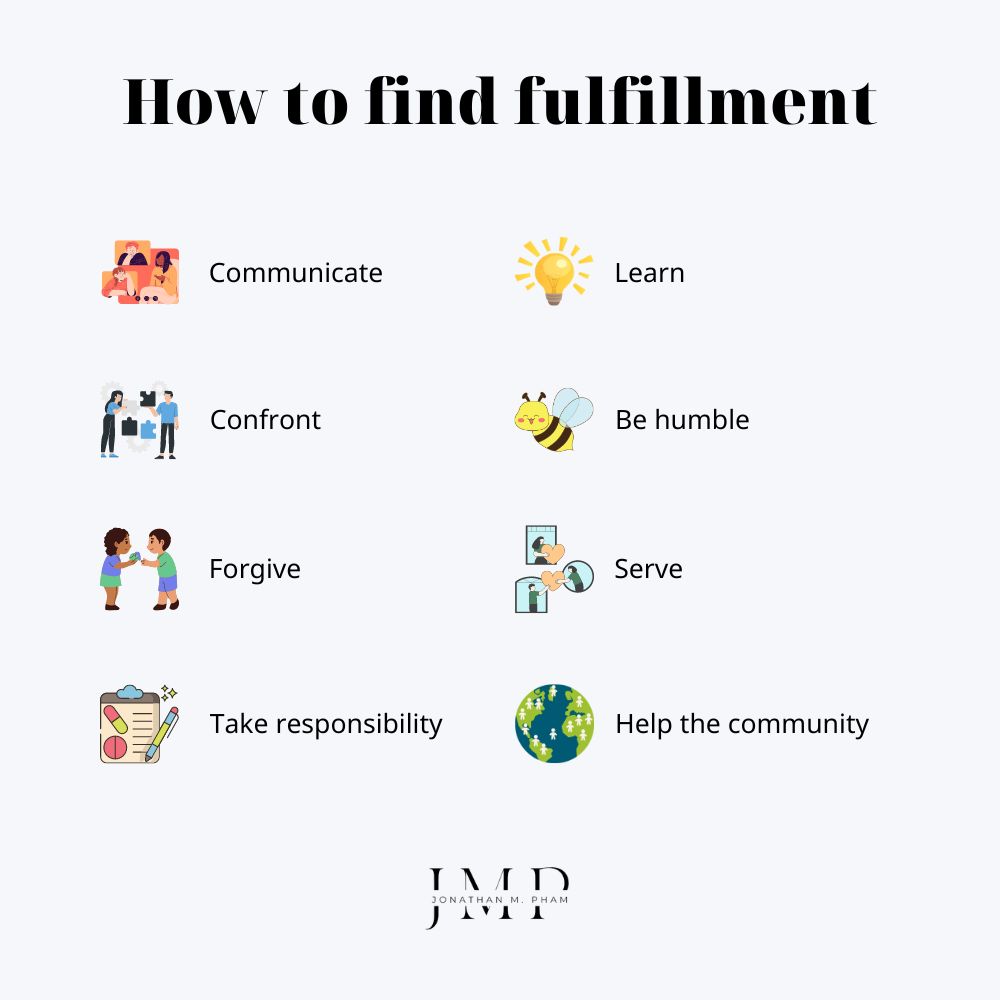Learn about the key pillars of fulfillment in life, plus how to find meaning & passion in the process of pursuing your aspirations.
In the journey of life, we all seek something more profound than fleeting happiness – we yearn for true fulfillment and a sense of purpose that ignites our souls. The pursuit of lasting contentment is a universal desire that binds humanity together, transcending borders, cultures, and beliefs.
Highlights
- Fulfillment is a sense of deep satisfaction derived from aligning personal aspirations with a meaningful purpose, culminating in overcoming challenges and achieving desired outcomes. It can be classified into 3 main types: self-fulfillment through personal growth, life fulfillment through positive experiences, and impact through contributions to others and society.
- Unlike happiness, which is a fleeting emotion arising from external factors, fulfillment involves a lasting sense of purpose and progress stemming from internal alignment and contribution.
- Despite unprecedented access to resources and opportunities, many people struggle with attaining life contentment due to factors like ingratitude, lack of purpose, feeling trapped, poor health, dwelling on the past, unrealistic comparisons, and the negative impacts of technology.
- Fulfillment often stems from a combination of purpose, strong connections, meaningful contributions, personal growth, engaging experiences, creative outlets, and overall life balance. As such, one should invest in open communication, addressing conflicts, practicing forgiveness, taking ownership, continuous learning, humility, and serving others within your community.
- Finding and embracing one’s unique purpose in life is a key factor in achieving true fulfillment.
- In pursuing life contentment, one should adopt an “earned life” mindset – which involves aligning aspirations, ambitions, and actions, balancing delayed gratification, embracing constant reinvention, building and promoting credibility, and consistently evaluating life priorities through the Life Plan Review process.
What is Fulfillment in Life?
Fulfillment in life is about having a vision – including a set of aspirations to work towards – and living in complete accord and flow with one’s values. It is about enjoying a genuinely meaningful life – one that is purposeful and satisfying.
At the heart of fulfillment lies purpose, the guiding star that illuminates our path and lends deeper meaning to our existence. When we align our aspirations with a higher goal, we are propelled forward, even amidst challenges and setbacks. Ambitions empower us to transcend personal limitations and leave a positive impact on the world.
The sense of fulfillment comes about when you have invested a significant amount of time and effort in something, such as climbing a mountain, working through a challenging assignment, or resolving a complex relationship difficulty.
It then progresses to a climax, when you are pleased with the end results of everything you have done. You may be fatigued and injured, but you believe the effort was worthwhile, and you are at peace with yourself and the world (even if only for a short period).
This is what it means to be fulfilled. The more meaningful the outcome, the more delighted you will feel.
Types of Fulfillment in Life
There are different ways to categorize types of fulfillment in life, depending on the perspective and criteria used. In this article, we will discuss the framework proposed by psychologists Doris Baumann and Willibald Ruch, which is made up of 3 categories:
Self-fulfillment
At the core of this type of fulfillment lies personal development and growth. It encompasses the pursuit of self-improvement, achieving one’s goals, and realizing one’s potential.
Self-fulfillment involves a journey of self-discovery, where individuals align their passions, values, and talents with their actions and decisions. It revolves around the idea of becoming the best version of oneself – both mentally and emotionally – which is achievable via finding inner peace, cultivating a positive mindset, and nourishing a strong sense of self-awareness.
Life fulfillment
A significant part of fulfillment in life stems from our life experiences – including moments of joy, contentment, and genuine happiness that arise from meaningful connections, cherished memories, and adventures. It’s about living in the present, savoring each moment, and embracing life’s ebb and flow with gratitude.
Under all circumstances, one may always find purpose and joy in the simple pleasures of existence – whether it’s spending quality time with loved ones, appreciating nature’s beauty, or immersing oneself in new cultures and experiences.
Impact & Legacy
The third source of fulfillment in life emanates from the positive influence one has on others and society as a whole. It is rooted in our desire to make a meaningful difference and leave a lasting impact.
Contributing to the greater good – be it through acts of kindness, community service, or sharing one’s knowledge and skills – often evokes a profound sense of purpose and contentment. Those who derive fulfillment from their impact on others often aspire to create a legacy that extends beyond their lifetime, leaving behind a positive imprint on future generations.

Most of the time, the three types above are interconnected and overlap in one’s pursuit of a meaningful life. Personal growth and self-awareness can lead to more fulfilling life experiences, which, in turn, amplify the positive impact on others. Conversely, contributing to the well-being of others brings about a sense of purpose that enhances one’s self-fulfillment journey.
Happiness vs Fulfillment in Life
Happiness is a byproduct of fulfillment, not a prerequisite.
Happiness and fulfillment are two related but distinct concepts that influence how we feel about our lives. The former is a temporary and dependent emotion that comes and goes – while the latter refers to a sustainable and internal state that comes from living a valued and purposeful life.
Happiness is often based on external factors, such as achievements, comparisons, or gratifications, that can change or be taken away at any moment. It can also be influenced by our expectations, beliefs, and perceptions of what will make us happy. Despite not being a bad thing, it is not the ultimate goal of our lives.
Fulfillment, on the other hand, is based on internal factors, such as values, passions, contributions, and growth, that are more stable and consistent. It comes from knowing that we are moving forward and progressing in one or more areas of our lives – and that we love the journey. Fulfillment also comes from finding meaning and purpose in what we do, and how we impact others and the world.
In a nutshell, happiness is what we feel along the way – while fulfillment is the feeling of approaching & reaching our destination.
| Feature | Happiness | Fulfillment |
| Nature | Temporary emotion | Sustainable state of being |
| Source | Often external factors (achievements, comparisons) | Internal factors (values, passions, growth) |
| Dependency | Dependent on external circumstances | Independent of external circumstances |
| Focus | Short-term, momentary pleasure | Long-term, purpose, and meaning |
| Relationship to life journey | Feeling along the way | Feeling of approaching and reaching the destination |
| Overall impact | Can fluctuate | Provides a sense of satisfaction and contentment |
To shift our focus from the former to the latter, we need to:
- Identify our core values and passions, and align our actions with them.
- Set meaningful and challenging goals that inspire us to grow and learn.
- Pursue activities that make us feel alive and engaged.
- Cultivate positive relationships with people who support us and share our vision.
- Express gratitude for what we have and what we have achieved.
- Practice self-care and compassion for ourselves and others.
- Seek to make a positive difference in the world through our gifts and talents.
Read more: Vision Board – Toolkit for Attracting Abundance & Supercharging Your Life

Why Do I Feel No Fulfillment in Life?
We are quite fortunate. Despite financial crises, increasing uncertainty, competition, and change, we live in a period where, at least in principle, fulfillment is far easier to obtain than it was centuries before. There are now countless tools available to attain financial stability, job fulfillment, improved health, and relationship contentment. But why are so many people still dissatisfied – despite having access to all fundamental necessities?
Various factors may contribute to a lack of fulfillment in life – including:
- Lack of gratitude
Gratitude is the appreciation of what one has, rather than focusing on what one lacks or wants. The feeling of gratitude helps increase happiness, well-being, and fulfillment by enhancing positive emotions, reducing negative emotions, and fostering a sense of meaning and purpose.
- Lack of purpose
Purpose is the sense of having a direction, a goal, or a mission in life that gives one motivation and satisfaction. It provides a framework for us to make decisions, overcome challenges, and cope with setbacks. Without a clear target to strive for, one may feel aimless, bored, or restless.
- Feeling trapped
This is a common occurrence – when what is happening in one’s life does not match their values, interests, or aspirations. Feeling trapped often results in frustration, resentment, or hopelessness.
To get out of such a situation, one may need to make changes in their life – such as pursuing new opportunities, exploring new options, or seeking help from others.
- Poor health
Health not only refers to the absence of disease – it is also about the presence of physical, mental, and emotional well-being. Without adopting habits such as eating well, exercising regularly, sleeping enough, and managing stress, it is easy for us to suffer from poor health – which then impairs our ability to enjoy life, perform well, and achieve goals.
A common bad habit that many of us fall into, living in the past means dwelling on regrets, mistakes, or losses that cannot be changed – as well as clinging to nostalgia, memories, or fantasies that are no longer relevant or realistic. When we immerse ourselves in such things, we deny the chance to learn from previous events, appreciate the present, and plan for the future.
- Comparison/ Unrealistic standards
Comparison is the act of measuring oneself against others, often in terms of achievements, possessions, or appearances. It makes us focus excessively on what we don’t have and distorts our perception of reality. When we frequently make comparisons, we open ourselves vulnerable to negative emotions such as dissatisfaction, envy, or insecurity – which all rob us of the chance to enjoy fulfillment in life.
- Technology
Technology is a double-edged sword that can both enhance and diminish one’s fulfillment in life. Despite providing us with access to information, entertainment, communication, and convenience, it also creates distraction, addiction, isolation, and overload that can impair our lives.
What Gives You Fulfillment in Life?
Fulfillment in life is a subjective and personal experience that varies significantly from person to person. That said, over time, researchers and scholars have come up with a list of things that have been proven to bring about feelings of contentment:
- Purpose: Having a sense of purpose in life gives people a reason to get up in the morning and feel like their lives have meaning. It can be anything from a big goal – like curing cancer, to a small one – like making your spouse or children happy.
- Connection: Humans are social creatures; as a result, we cannot live meaningful connections with others. This includes close relationships with family and friends, as well as a sense of belonging to a community or group.
- Contribution: Making a positive impact on the world is a powerful source of fulfillment for many people. You may consider volunteer work, activism, or simply being a good friend or neighbor.
- Growth: Learning and growing as a person is another key ingredient for a fulfilling life. This can involve setting and achieving goals, trying new things, and expanding your horizons.
- Engagement: Being fully engaged in an activity or experiencing a state of “flow” – where you’re completely immersed and absorbed in what you’re doing – can lead to a deep sense of satisfaction.
- Creative expression: Engaging in creative pursuits, whether it’s through art, music, writing, or other forms of self-expression, has been proven to provide a fulfilling outlet for emotions and thoughts.
- Well-roundedness: Striving for balance in various aspects of life, such as work, relationships, leisure, and self-care, may result in a more fulfilling and satisfying life overall.

Read more: Ikigai (生き甲斐) – The Blueprint for a Purposeful & Fulfilling Life
How to Find & Gain Fulfillment in Life
Communicating
Communication serves as a non-dispensable component in human interactions. Just as a broken limb severs the flow of nerve signals, a lack of communication hinders connections between individuals and society as a whole.
Confronting
Our unwillingness to confront challenges is what allows them to persist and hold power over us. For example, your fear of public speaking may drive you to weasel away from giving presentations at work or in class – which in turn prevents you from advancing in your career or getting the education you want.
True growth starts with us daring to face our inner “demons” and limitations head-on. To transcend the confines of self-awareness, one must be willing to accept their vulnerabilities and insecurities. By doing so, we unify our fragmented self-image and step into a realm of inner strength where nothing holds superiority over us.
Forgiving
As mentioned, a winning-too-much mindset characterized by constantly comparing oneself to others only leads to unfulfilled needs and lingering resentment. For us to tread the path to liberation, we must learn to let go – for our sake and for that of others.
Embracing forgiveness allows us to release the burden of holding on to grudges and negative emotions, granting us freedom and a chance to evolve.
Taking responsibility
In modern times, the reluctance to accept responsibility has become a norm – stemming from our own feelings of inadequacy. And yet, amidst the current culture of victimhood, accountability becomes more crucial than ever – so that we may be empowered to shape our destinies.
Now, imagine you are a student who keeps failing their classes. Instead of accepting responsibility for your poor grades, you believe that you are not smart enough to succeed in school – as such, you give up and blame the teachers or the school system for their failures. In doing so, you deny yourself the chance to improve and live a truly content life.
Read more: Passing the Buck – Why Do We Often Play the Blame Game?

Learning
True knowledge arises from experience, not mere information. Fear should never hinder us from seeking to understand new things. Through learning, we expose ourselves to opportunities, expand our horizons, grow as individuals, and ultimately live more fulfilling lives.
Being humble
The path to fulfillment lies in accepting change and being flexible in our perspectives. Being open to the idea of being mistaken allows us to discover new knowledge and insights that were previously unknown to us.
Serving
Giving is more blessed than receiving.
Acts 20:35
The key to living a meaningful life is through giving. That said, the quality of help we offer does make a significant difference in achieving fulfillment.
True assistance eliminates the need for further help. Instead of simply giving someone money, empowering them with the knowledge and skills to earn it for themselves should prove to be a much more effective approach.
Helping the community
Life is not a competition, but a collaborative endeavor – in other words, community over competition. When striving to achieve our goals, it is far more beneficial to focus on improving our own skills and abilities, rather than bringing others down.
As humans, everyone is connected. We can learn and grow faster when others are ahead of us, and we should be grateful for their guidance.
No man is an island.

Finding Fulfillment in Oneself
Discovering personal fulfillment is a valuable and meaningful pursuit – and yet, it often proves to be a challenging endeavor, particularly when faced with obstacles and adversities. In order to truly find inner contentment, you may want to consider the following tips:
- Cultivating a positive circle
The atmosphere you surround yourself with holds immense influence over your happiness. Should you notice that your interactions predominantly involve individuals who have a negative impact on your mood and outlook, it might be time to expand your social connections. Ideally, seek out companions who inspire positivity and guide you towards an optimistic mindset.
- Making use of visualization
Set objectives for yourself, both in your personal and professional domain. Whether you aspire to shed weight, pursue advanced education, or improve your hydration habits, the likelihood of accomplishment is heightened if tangible goals are established. Following goal-setting, formulate a step-by-step plan for their realization, and spend time envisioning the path to success.
- Commemorating milestones
Whenever you attain success and fulfill your goals, remember to celebrate these “victories” and reward yourself in some manner. For example, you may extend yourself commendation for a job well executed, whether it involves an evening out with friends, the acquisition of a long-awaited item, a self-indulgent day, or any other form of recognition.
- Assuming control
Entrusting others, such as a partner or friend, with the responsibility for your fulfillment is a common pitfall. Remember, your own contentment and satisfaction are entirely within your jurisdiction. Rather than attributing your happiness to external factors, embrace accountability for your well-being – and devise strategies to find fulfillment regardless of external circumstances or interactions.
Read more: 12 Stoic Principles to Live by in the Modern Life
- Extending a helping hand
One of the most effective avenues to attaining fulfillment in life is to share your resources with others. Whether it pertains to time, finances, or skills, contributing to the betterment of others is bound to not only assist them but also contribute to your own sense of happiness.
- Prioritizing self-care
While assisting others is commendable, it is imperative that you don’t forget to tend to your own needs as well. Grant yourself periods of rest when warranted, adopt a healthful and active lifestyle, nourish your body with proper nutrition, engage in regular physical activity, and ensure adequate sleep. These practices not only enhance your physical health – but also bolster your emotional and mental well-being.
- Unearthing positivity
Life often presents challenges and inequities that appear daunting. Even in the bleakest circumstances, opportunities for positivity still abound. It could be as modest as a captivating sunset or a kind utterance from a stranger, or as substantial as a fresh prospect or a supportive confidant. Focus your attention on these positive aspects, and cultivate a sense of gratitude, which can aid in stress management and amplify your overall happiness.
Read more: Habits in Personality Development – A Comprehensive Guide

The Key to Real Fulfillment is to Find the Meaning of Life
Discovering one’s purpose is a transformative journey that can profoundly impact overall fulfillment and bring a sense of profound meaning to life. With a clear purpose comes a profound sense of direction, passion, and alignment with our values. This newfound clarity provides us with a deeper understanding of our unique contribution to the world, leading to a more fulfilling and purpose-driven existence.
The meaning of life is one of the most profound and elusive questions that humans have ever asked. It is also one of the most personal and subjective ones, as different people may find different sources and expressions of meaning in their lives.
Finding meaning in life is not only a philosophical or existential quest, but also a psychological and practical one, as it can have significant implications for our well-being, happiness, and fulfillment. It is not something that is given to us by nature, society, or religion – but something that we create and discover for ourselves through our choices, actions, and reflections. In addition, it is also not something fixed or static – but can evolve depending on changes to our circumstances, experiences, and values.
Read more: Spiritual Purpose – The Quest for the Soul’s Calling

Guide to Living an Earned Life
In the pursuit of fulfillment, it is essential to embrace an “earned life” mindset, where we consciously choose fulfillment over regret – which is the result of decisions that irrevocably alter our lives, reroute our destinies, and haunt our memories.
As discussed by Dr. Marshall Goldsmith in his latest bestseller “The Earned Life“, one common factor that denies us happiness is regret, there are 5 things we can do to start losing regret and experiencing fulfillment in life:
Aligning your aspirations, ambitions, and actions
Here, we have 3 key elements that constitute a fulfilling life:
- Having a clear aspiration that defines the purpose behind our actions.
- Setting specific ambitions with targets or deadlines, and
- Taking consistent actions towards our goals.
During this process, we must constantly remind ourselves not to focus only on immediate tasks without a clear purpose – as well as not to envision grand ideas without taking practical steps. Additionally, do your best to not become achievement-driven; true self-worth should not solely depend on accomplishments, as they do not bring about real lasting satisfaction.
Eating the marshmallow
Walter Mischel’s research at Stanford revealed that children who chose to wait for two marshmallows showed greater long-term achievement compared to those who opted not to wait. While delayed gratification is often promoted as a virtue, excessively trying to defer it can lead to a life filled with prolonged waiting and a lack of enjoyment.
The key here is to strike a balance between delaying pleasure for future goals – and cherishing present moments of fulfillment, enabling us to savor life’s sweetness to the fullest.
Read more: Goal Obsession – The Ultimate Flaw that Demolishes Success
Practicing the “new me” paradigm
This approach is drawn on the Buddhist philosophy of impermanence – it highlights the notion of constant reinvention and recreation as we navigate through life. The prevailing Western myth revolves around the belief that someday, we will attain lasting happiness by achieving certain milestones:
“I’ll be happy when I have money, status, a BMW, or a condominium.”
However, the reality is that there is no definitive “when” for happiness. The concept of “happily ever after” found in fairytales is mere fiction and does not reflect the complexities of the real world.
Happiness is not solely dependent on external accomplishments. Instead, it is an internal state that can be cultivated independently of one’s achievements or possessions. Embracing impermanence and letting go of the “I’ll be happy when” myth allows us to find contentment and joy in the present moment, regardless of our external circumstances.
Read more: Memento Mori – A Reminder of Life’s Impermanence & How to Live the Right Way
Credibility must be earned twice
Building credibility is a two-fold process. Firstly, one must showcase competence and consistently deliver exceptional work.
However, simply relying on the quality of one’s work is not enough, as good work does not speak for itself. Instead, it is equally crucial to be recognized and acknowledged for these achievements.
The key lies in promoting oneself when it aligns with making a positive difference – and refraining from self-promotion when it serves no meaningful purpose. By understanding the dynamics of credibility-building and embracing responsible self-promotion, one is better equipped to achieve meaningful outcomes and create a lasting impact in their endeavors.
Establishing the Life Plan Review (LPR)
The Life Plan Review (LPR), proposed by Dr. Goldsmith, is built on something called the “daily question process” with a group of remarkable individuals during the COVID-19 pandemic. This approach emphasizes the significance of creating a list of essential priorities in life and evaluating daily progress.
The LPR entails asking essential questions to assess one’s efforts and actions. These questions encompass various aspects of personal development, such as setting clear goals, making progress towards achieving them, finding meaning, fostering happiness, building positive relationships, and staying fully engaged in life.
By consistently reflecting on them, we are equipped with valuable insights into our daily behaviors and decisions. This introspective practice allows for continuous growth, enhancing goal attainment, nurturing well-being, and fostering meaningful connections.
Read more: 200 Self-reflection Questions – Toolkit for Life Pilgrims
Fulfillment in Life Quotes
Success without fulfillment is the ultimate failure.
Tony Robbins
Doing what you like is freedom, liking what you do is happiness.
Anonymous
True fulfillment comes from helping others.
Anonymous
It is not in the pursuit of happiness that we find fulfillment, it is in the happiness of pursuit.
Denis Waitley
Happiness is a state of inner fulfillment.
Matthieu Ricard
To have an extraordinary quality of life you need two skills: the science of achievement and the art of fulfillment.
Tony Robbins

How Coaching Helps With Finding Fulfillment in Life
Coaching plays a vital role in helping individuals find fulfillment in life. The role of coaches is to help clarify one’s goals and values, encourage self-exploration, and challenge limiting beliefs. They assist coachees with coming up with action plans, provide support and accountability, and explore new perspectives.
Coaching also contributes significantly to navigating challenges, achieving life balance, building confidence, and celebrating milestones. Through this transformative process, coachees gain clarity, empowerment, and a renewed sense of purpose, leading to greater satisfaction and contentment in their life’s journey.
Final Thoughts
In the pursuit of fulfillment in life, the journey towards discovering meaning and embracing passion becomes an art of self-discovery and continuous growth. By fostering a deep connection with our values, nurturing meaningful relationships, and engaging in activities that ignite our inner fire, we unlock the door to a life rich in purpose and satisfaction.
Remember, fulfillment isn’t a destination – rather, it is a dynamic process that evolves with each step we take. Embracing this mindset empowers us to navigate life’s challenges with resilience and to savor the beauty of each day, ultimately leading us to a life defined by purpose, passion, and an unwavering sense of contentment.
You may be interested in:
- Choosing Your Life: From ‘Drifting’ to ‘Defining’
- Work-life Balance: 14 Tips to Unplug & Recharge (Both at Work & in Life)
- 60 Existential Questions: A Daily Toolkit to Explore Life’s Depths
- 250 Bucket List Ideas for Living Abundantly
Let’s Tread the Path Together, Shall We?


